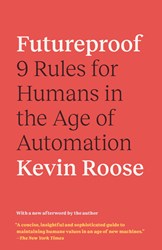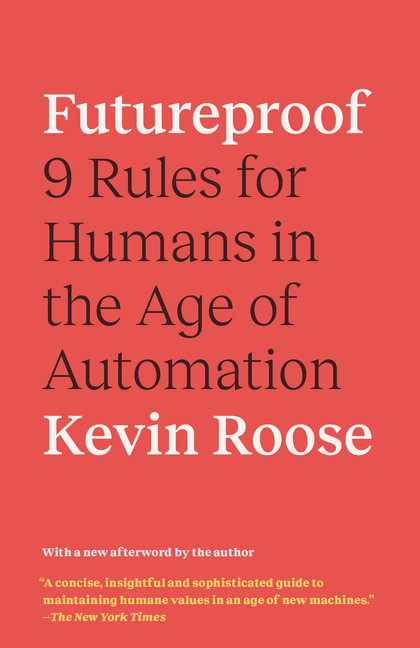Futureproof: 9 Rules for Humans in the Age of Automation
March 31, 2023
From "a practical, deeply reported survival guide for the age of AI, written by the New York Times tech columnist who has introduced millions to the promise and pitfalls of artificial intelligence," one of Kevin Roose's 9 Rules for Humans in the Age of Automation is to "Demote Your Devices."
Kevin Roose launched a new AI newsletter with The New York Times this week, so we thought we'd revisit his book on the topic, Futureproof: 9 Rules for Humans in the Age of Automation.
The following excerpt, from the chapter encouraging readers to "Demote Your Devices," is a helpful reminder that we should always make sure we are in control of how we use the technology we bring into our lives and not let that technology control us.
◊◊◊◊
 Humans have worried about the degrading psychological effects of machines for centuries. (Adam Smith warned in The Wealth of Nations that automated factory equipment was making us “as stupid and ignorant as it is possible for a human creature to become.”) And in recent years, sounding the alarm about the negative consequences of smartphone use has become a thriving cottage industry. We now have “screen detox” resorts for adults, screen-time consultants for kids, and “digital sabbath” groups that encourage members to unplug completely for one day a week. We have even invented new phones to solve the problems with our old phones—like the Light Phone, a $250 “dumbphone” with a black-and-white display that can only be used for calling and texting.
Humans have worried about the degrading psychological effects of machines for centuries. (Adam Smith warned in The Wealth of Nations that automated factory equipment was making us “as stupid and ignorant as it is possible for a human creature to become.”) And in recent years, sounding the alarm about the negative consequences of smartphone use has become a thriving cottage industry. We now have “screen detox” resorts for adults, screen-time consultants for kids, and “digital sabbath” groups that encourage members to unplug completely for one day a week. We have even invented new phones to solve the problems with our old phones—like the Light Phone, a $250 “dumbphone” with a black-and-white display that can only be used for calling and texting.
[…] I’m not a screen-time fundamentalist, and my goal isn’t to convince you that you’re using your phone too much. (Even though you may well be.) Instead, I want you to do something I wish I’d done years ago: to take an honest, searching look at the relationship you have to your devices, and ask yourself the question, Who’s really in charge here?
The answer to this question is important for a few reasons.
First, in order to do the kind of deeply human work we will need to do in the coming years—all of the social, surprising, and scarce tasks that will separate us from the machines—we need to be in control of our own bodies and minds, and be able to harness and direct our own attention.
Second, we need to understand the way that ceding control to our devices can harm our relationships with other humans. The psychologist Sherry Turkle has written at length about the phenomenon of “phubbing”—a strange-sounding but useful neologism that is short for “phone snubbing,” and that describes the act of avoiding interactions with someone in favor of using your phone. She writes that phubbing amounts to “a flight from conversation—at least from conversation that is open-ended and spontaneous, conversation in which we play with ideas, in which we allow ourselves to be fully present and vulnerable.”
Studies have shown that phubbing—or merely having our phones near us while we’re interacting with other people—makes it harder for us to have enjoyable experiences with other people. One such study, conducted at the University of British Columbia, observed more than 300 people sharing a meal at a restaurant with friends and family. Half the participants were told to keep their phones on the table, with the ringer or vibrate setting turned on. The other half were told to silence their phones and put them away in a container. After the meal, the participants were given a questionnaire about their experience of the meal. People in the phones-on-the-table group re-ported enjoying their meals less, and being more bored and distracted, than people in the phones-in-a-container group.
All the evidence we have suggests that what matters is how we use our devices, not just how often we pick them up. Studies have suggested that certain types of device use are better for our mental well-being than others. For example, using Facebook passively (scrolling through our feeds, watching videos, absorbing news updates) has been shown to increase anxiety and decrease happiness, while using Facebook more actively (posting status updates, chatting with friends) has been shown to have more positive effects.
Which brings me to the third reason it’s important to demote our devices, which is that by letting our smartphones and other devices steer our lives, we’re missing out on many of the amazing, humanizing things we can use these machines to do.
For me, this hit home during the early days of the Covid-19 pandemic, when screen-based activities became my primary forms of social interaction. I attended happy hours and game nights over Zoom, held long FaceTime calls with my family across the country, and sent flurries of group texts with my closest friends.
What these positive experiences had in common was that they involved other people, and that while technology made them possible, I ultimately chose them, controlled them, and set the terms of my engagement. I didn’t get manipulated into these interactions by a clever UX hack or an algorithm’s invisible nudges. And while the companies whose tools powered those interactions may have benefited from my engagement, they gave me something of real human value in exchange for my attention and my data.
The difference between using our devices in a way that amplifies our humanity and a way that diminishes it, in other words, usually comes down to who’s doing the driving.
Excerpted from Futureproof: 9 Rules for Humans in the Age of Automation.
Copyright © 2021, 2022 by Kevin Roose


